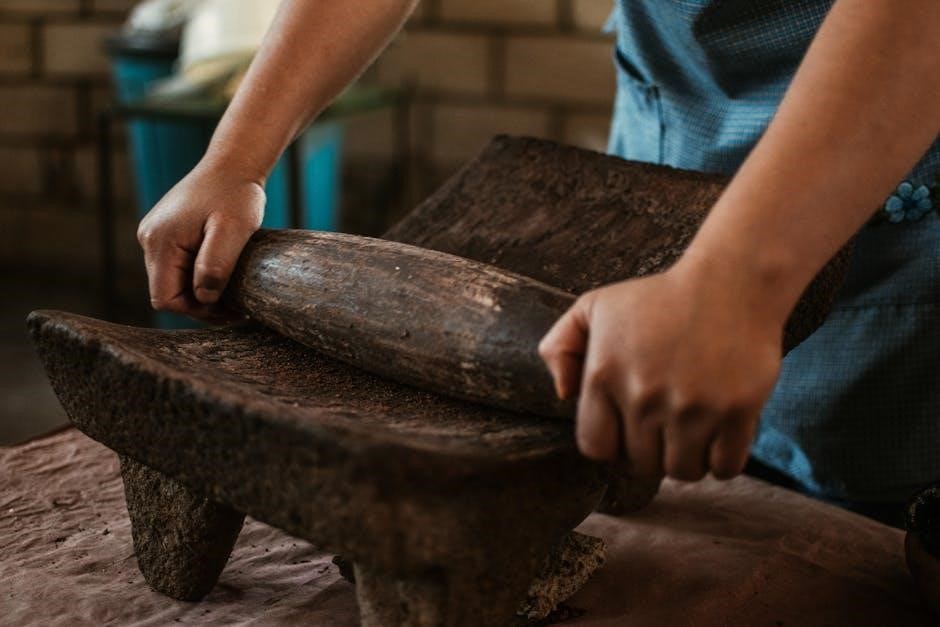manual mills
Manual mills are essential tools for grinding grains into flour, with various models available, including electric and manual options, suitable for different needs and preferences, using stainless steel materials.
Definition and Purpose
Manual mills are defined as devices used to grind or crush grains into flour, with the purpose of providing a means to produce fresh flour at home, allowing for greater control over the quality and nutritional content of the final product. The primary purpose of manual mills is to enable individuals to grind their own grains, which can be particularly useful in emergency situations or for those who prefer to mill their own grains for health or culinary reasons. Manual mills are designed to be simple, durable, and easy to use, making them a popular choice for many people. They are also often used to grind other materials, such as spices, seeds, and nuts, making them a versatile addition to any kitchen. Overall, the purpose of manual mills is to provide a reliable and efficient means of grinding grains and other materials. Manual mills have been used for centuries.

Types of Manual Mills
Manual mills include various styles, such as burr-style and roller mills, offering different grinding options, with distinct features and uses, for various grain types, every day.
Burr-Style Mills
Burr-style mills are a type of manual mill that uses abrasive surfaces to grind grains into flour. These mills are known for their high-quality grinding and are often preferred by those who want to grind their own grains at home. The burrs are typically made of stainless steel or stone and are designed to last for a long time. Burr-style mills are also relatively easy to use and require minimal maintenance. They are a great option for those who want to grind small quantities of grain at a time. Some popular models of burr-style mills include the Wonder Mill Junior Deluxe and the Country Living Grain Mill. These mills are versatile and can be used to grind a variety of grains, including wheat, oats, and barley. They are also easy to clean and store, making them a great addition to any kitchen.

Features of Manual Mills
Manual mills have durable construction and versatile grinding capabilities always available online.
Materials and Construction
Manual mills are made from high-quality materials, including stainless steel, which provides durability and resistance to corrosion. The construction of manual mills is also designed to be sturdy and long-lasting, with parts that are easy to replace and maintain. Many manual mills have a compact design, making them easy to store and transport. The materials used in manual mills are also non-toxic and safe for grinding food, ensuring that the flour produced is healthy and safe to consume. Additionally, manual mills often have a simple and intuitive design, making them easy to use and operate, even for those who are new to grinding their own flour. Overall, the materials and construction of manual mills are designed to provide a reliable and efficient grinding experience. Manual mills are a great option for those looking for a healthy and sustainable way to grind their own flour.

Benefits of Manual Mills
Manual mills provide healthy and nutritious flour, with numerous benefits, including emergency preparedness and food independence, using simple and efficient mechanisms always.
Emergency Preparedness
Manual mills play a crucial role in emergency preparedness, allowing individuals to grind grains into flour without relying on electricity, using a simple and efficient hand-crank mechanism. This feature is particularly important in situations where power outages occur, enabling people to maintain a steady food supply; With a manual mill, individuals can grind a variety of grains, including wheat, corn, and oats, providing a reliable source of nutrition. Additionally, manual mills are often compact and portable, making them easy to store and transport in emergency situations. Overall, manual mills are a valuable tool for emergency preparedness, providing a means of producing fresh flour and promoting food independence. They are an essential component of any emergency food supply kit, offering a sustainable and reliable solution for grinding grains. Manual mills are a worthwhile investment for anyone seeking to prepare for emergencies.

Popular Manual Mill Models
Manual mills include Wonder Mill Junior Deluxe and Victoria Manual Grain Grinder models available.
Wonder Mill Junior Deluxe
The Wonder Mill Junior Deluxe is a manual grain mill designed for grinding dry and oily grains into fine flour. This model is a popular choice among users due to its durability and ease of use. The mill features a stainless steel construction and a manual hand crank for grinding grains. It is capable of grinding a wide range of grains, including wheat, corn, and beans, as well as oily materials like nuts and seeds. The Wonder Mill Junior Deluxe is a versatile tool that can be used in various settings, from home kitchens to emergency preparedness situations. With its compact design and manual operation, this mill is a reliable option for those looking for a simple and effective way to grind their own grains. It is a valuable addition to any kitchen or emergency preparedness kit.
Manual mills provide a reliable means of grinding grains, offering a simple and effective solution for various needs, using manual hand cranks and stainless steel materials always.
Importance of Manual Mills
Manual mills play a crucial role in ensuring food security and sustainability, providing a means of grinding grains into flour, even in the absence of electricity, using manual hand cranks and stainless steel materials. They offer a reliable and efficient way to process grains, allowing individuals to have control over their food production. The importance of manual mills lies in their ability to provide a simple and effective solution for grinding grains, making them an essential tool for households and communities. With their durability and versatility, manual mills are a valuable asset for anyone looking to grind their own grains, and their importance cannot be overstated, as they provide a means of food production that is not dependent on modern technology, using traditional methods and materials always available.
